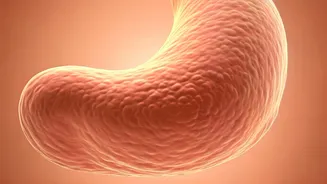Protein Deficiency Exposed
One of the most frequent errors that can sabotage your weight loss ambitions, particularly in the abdomen, is inadequate protein intake. Protein is more
than just a bodybuilding supplement; it is vital for satiating hunger and promoting muscle growth. When you don't eat enough protein, your body may struggle to maintain and build muscle mass. This is counterproductive because lean muscle tissue helps boost your metabolism, allowing you to burn more calories even while resting. A body with less muscle mass finds it difficult to burn fat efficiently, which makes fat accumulation, especially in the abdominal region, more likely. Insufficient protein consumption can also cause overeating, as you will experience increased cravings, and increased feelings of hunger because protein helps to keep you feeling full. Include protein-rich foods such as lean meats, poultry, fish, eggs, and dairy products in your daily diet.
Stress and Fat Storage
High levels of stress, a pervasive problem in contemporary living, can have a surprising effect on weight reduction. While you might be exercising frequently, chronic stress elevates cortisol levels, often known as the 'stress hormone.' Cortisol has a profound effect on the body's metabolism and fat storage. One of the main ways cortisol influences fat accumulation, particularly in the abdominal region, is by boosting fat storage. Furthermore, persistent stress can impair your sleep quality, which is crucial for controlling hunger hormones, such as ghrelin and leptin. Poor sleep can lead to overeating and a preference for high-calorie, processed meals. To manage stress and support your weight loss efforts, include stress-reduction practices like yoga, meditation, or spending time in nature into your daily routine. Prioritizing rest helps to regulate hormone levels and support your metabolism.
Processed Food Snares
Consuming processed foods, even in modest amounts, can negatively impact weight reduction and significantly hinder progress. Despite the fact that you may be eating less, the types of food you select have a significant impact on your body's fat storage. Processed foods, which are frequently heavy in added sugars, unhealthy fats, and refined carbs, are notorious for contributing to weight gain, particularly in the abdominal area. These ingredients cause inflammation, which makes it harder to lose weight. Processed foods frequently lack the fiber and nutrients that are necessary for satiety, which results in overeating and cravings. Switching to a diet that emphasizes whole, unprocessed foods like fruits, vegetables, lean proteins, and whole grains is a simple solution. This kind of eating not only encourages weight reduction but also improves general health.
Sleep Deprivation Danger
Many people underestimate the importance of sleep in weight management, but getting enough sleep is essential for controlling metabolism and managing body composition. Not getting enough sleep can disrupt the hormonal balance that regulates hunger and fullness, which can lead to weight gain. Insufficient sleep raises the levels of ghrelin, the hunger-inducing hormone, and lowers the levels of leptin, the satiety-signaling hormone. These hormone imbalances make you crave unhealthy foods and increase the likelihood of overeating. Poor sleep can also impair your metabolism and decrease your body's capacity to burn calories effectively. The National Sleep Foundation recommends that adults strive for at least seven to nine hours of sleep per night to support healthy weight management. Create a sleep-friendly environment and get into a consistent sleep schedule to improve your sleep habits. This will help to control hunger hormones and support your fat-loss goals.
















